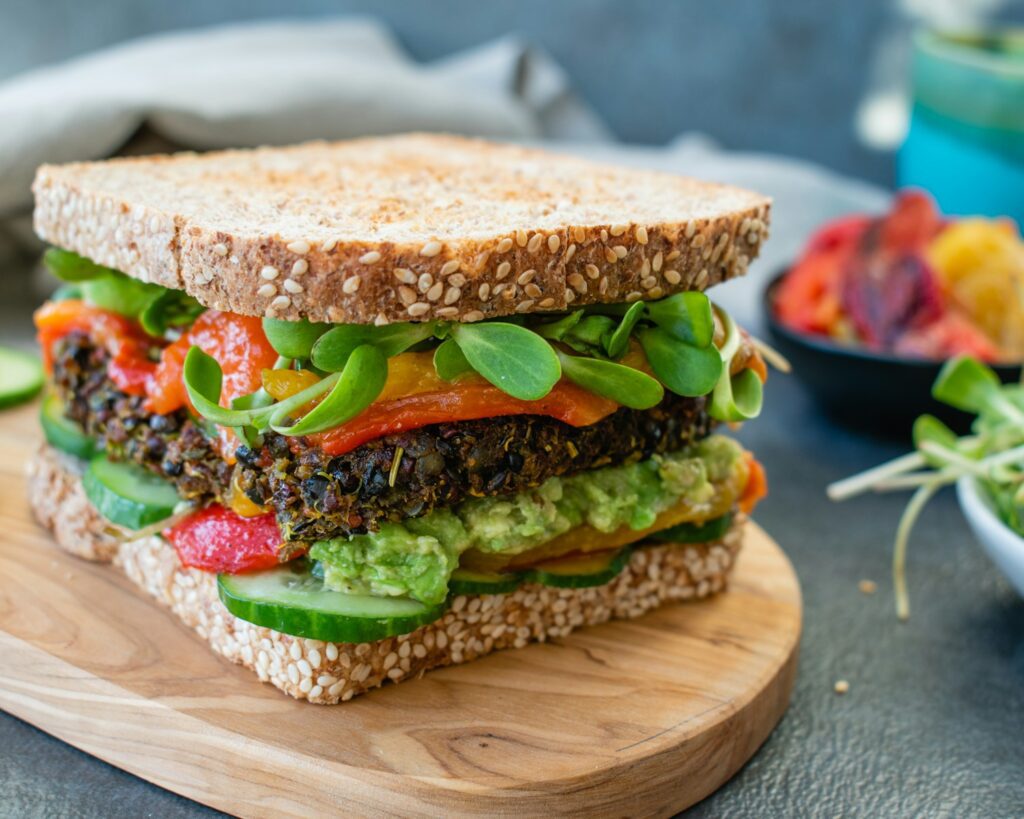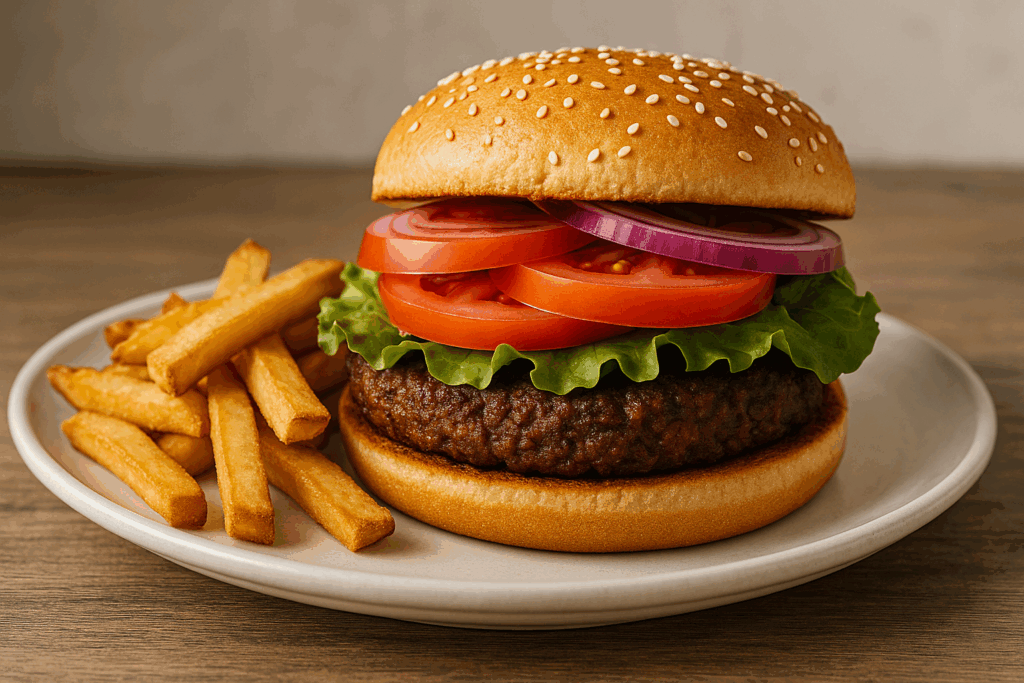
Not long ago, the idea of a meatless burger was met with skepticism. Today, plant-based burgers are found in grocery aisles, fast food menus, and gourmet restaurants alike. Once dismissed as a passing health fad, they’ve grown into a powerful movement shaping the future of food.
From climate-conscious consumers to people seeking healthier lifestyles, the shift to meatless options is accelerating—and all signs point to one conclusion: plant-based burgers are here to stay.
The Plant-Based Boom
Consumer interest in plant-based eating has surged in recent years. According to Statista, sales of plant-based food in Canada grew to over $800 million in 2022, with meat alternatives leading the charge.
“The appeal lies in more than just health,” says Jennifer Bartashus, senior analyst at Bloomberg Intelligence. “People are also looking for ethical, sustainable, and environmentally-friendly choices—without giving up the pleasure of eating.”
The Climate Case
Beef production is one of the most resource-heavy industries on the planet. According to the Food and Agriculture Organization (FAO), livestock farming contributes approximately 14.5% of global greenhouse gas emissions, making it a major driver of climate change.
Plant-based burgers offer a clear alternative. A life-cycle analysis from the University of Michigan found that a Beyond Meat burger produces:
- 90% fewer greenhouse gas emissions
- 99% less water usage
- 93% less land use
compared to a traditional beef patty.
“Choosing a plant-based meal, even once or twice a week, can make a measurable environmental impact,” says Dr. Tushar Mehta, a Canadian physician and sustainability researcher.
Healthier Doesn’t Mean Bland
While not all plant-based burgers are “healthy” by default, many offer benefits like less saturated fat, no cholesterol, and higher fibre content compared to conventional meat.
The American Heart Association recommends plant-based eating to lower the risk of heart disease, Type 2 diabetes, and some forms of cancer.
But it’s important to read ingredient labels.
“Look for burgers made with whole foods like legumes, mushrooms, and grains rather than ultra-processed soy isolates,” advises Desiree Nielsen, RD, a registered dietitian and author of Eat More Plants. “Just because it’s vegan doesn’t mean it’s automatically healthy.”
Better Taste, Better Tech
Old-school veggie patties were often dry and unconvincing. But modern plant-based burgers have come a long way thanks to food tech innovation.
Companies like Beyond Meat and Impossible Foods have invested millions into perfecting texture and flavour, using ingredients like pea protein, coconut oil, and plant-based heme to create burgers that sizzle, taste, and look like beef.
These innovations are winning over meat-eaters. In blind taste tests, many people can’t tell the difference—and that’s reflected in restaurant adoption. Chains like A&W Canada and Burger King now offer plant-based burgers across the country.
“Today’s meatless burgers grill beautifully, hold together, and are packed with umami. It’s a chef’s dream,” says Toronto restaurateur Mathew Dearing.
The Flexitarian Factor
You don’t have to be vegan to eat plant-based. The rise of flexitarianism—a diet that emphasizes plant-based meals without cutting meat entirely—is contributing to plant burger popularity.
A 2023 Dalhousie University survey found that nearly 40% of Canadians are actively trying to reduce their meat consumption.
“Flexitarianism is about progress, not perfection,” says Dr. Sylvain Charlebois, director of the Agri-Food Analytics Lab. “A plant-based burger once or twice a week is a simple, low-barrier change.”
Prices Are Dropping
One of the early criticisms of plant-based burgers was price. But now, as more brands enter the market and economies of scale kick in, prices are becoming competitive with premium meat products.
In fact, grocery brands like President’s Choice, Gardein, and Lightlife offer affordable meatless burgers in major Canadian supermarkets.
The Canadian government is also backing the shift. Protein Industries Canada has invested in over 50 plant-based food projects to accelerate production and affordability.

Cultural Shift and Mainstream Appeal
Plant-based burgers have moved from niche to norm. They’re now served at Tim Hortons (regionally), Harvey’s, and even gourmet restaurants. Their presence in major chains is a sign of growing mainstream appeal.
Celebrities and influencers—like Lewis Hamilton, Natalie Portman, and Lizzo—are also helping shift public perception.
“Seeing everyday people and public figures enjoying plant-based meals helps normalize it,” says Sonya Singh, a plant-based food blogger based in Ontario.
Innovation Isn’t Slowing Down
The next wave of plant-based meat innovation is already underway. Startups are experimenting with fermented proteins, mycelium (mushroom roots), and even lab-grown plant fibers to enhance flavour and nutrition.
Companies are also working to make meatless options allergen-friendly, soy-free, and high in Omega-3s—pushing plant-based foods toward even broader audiences.
“We’re still just scratching the surface of what’s possible,” says food scientist Dr. Martin Gill from the University of Guelph. “Within five years, we’ll see options that rival meat in nutrition, taste, and price—without the ethical baggage.”
Final Bite: The Plant-Based Burger Isn’t a Trend—It’s a Transformation
From taste to price, from health to climate, plant-based burgers tick all the boxes. They align with consumer values, satisfy cravings, and offer an accessible way to reduce your impact without giving up flavour.
As the food system evolves, plant-based burgers are no longer just a “substitute”—they’re a first choice.
Whether you’re vegan, vegetarian, flexitarian, or just curious, the plant-based burger isn’t going anywhere. In fact, it’s only getting started.















